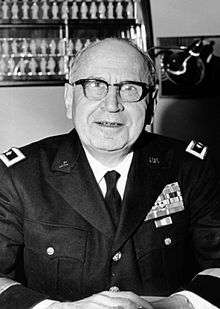Julius Klein
| Julius Klein | |
|---|---|
 Julius Klein in his uniform | |
|
| |
| Born | 1901 |
| Died | 1984 (aged 82–83) |
| Occupation | journalist, spy, business executive and United States Army general. |
Julius Klein (1901–1984) was an American, journalist, spy, business executive and United States Army general.
Biography
Julius Klein was born in 1901 in a Jewish family. During World War I he was an American spy in Germany. Klein's connection to the House of David as a descendant of Rabbi Meir Katzenellenbogen is illustrated in The Unbroken Chain.[1] After the war, Klein worked in Chicago as a journalist and later as Hollywood executive. He is also credited with being the first person to run radio broadcasts in German in the USA.[2]Julius Klein, 1901-1961, "was a hero during World War II, when he saved many lives during an explosion at New Caledonia in the South Pacific. In 1941, he formulated an important military plan called "Combat Public Relations", which encompassed such topics as psychological warfare and propaganda. He also helped ameliorate both German-American and German-Israel relations after World War II."[3]
Civilian Career
After serving as a spy in Germany in World War I, he began his civilian career in the 1920s as a criminal reporter for The State Herald, a Hearst Corporation newspaper in Chicago, and initiated the first German language radio broadcasts in the United States. Klein also originated the South Pacific edition of The Stars and Stripes military newspaper, unsuccessfully ran for Congressman at Large as Republican in 1932, and for the United States Senate in 1954. He wrote the screenplay, Black Cargo, during a Hollywood stint (1934-39) when Klein tried unsuccessfully to produce films on the life of World War I General John Pershing.[3]
World War II
In 1933 Klein joined the Illinois National Guard, becoming a lieutenant colonel in 1941. He formulated the Combat Public Relations plan dealing with psychological warfare and propaganda and was also stationed in the Philippines.
Public service
In 1947, Julius Klein was elected the National Commander of the Jewish War Veterans of the United States of America. On April 4, 1948, as National Commander of the Jewish War Veterans, Klein organized an enormous show of strength for the establishment of the State of Israel in the form of a JWV parade down New York's Fifth Avenue. The parade influenced the United States to vote for the partition of Palestine and the State of Israel was born in May, 1948.[3]
References
- ↑ Rosenstein, Neil. "The Unbroken Chain: Biographical Sketches and Genealogy of Illustrious Jewish Families from the 15th-20th Century," Volumes 1 and 2, Revised Edition, CIS Publishers: New York, 1990. ISBN 0-9610578-4-X.
- ↑ Brody, Seymour. "Major General Julius Klein: Hero of World War II and Assist. Secretary of Commerce," Florida Atlantic University, Jewish Generals and Admirals in America's Military. Retrieved December 1, 2012.
- 1 2 3 National Museum of American Jewish Military History, "Major General Julius Klein: His Life and Work," Washington, D.C. Retrieved December 1, 2012."Archived copy". Archived from the original on 2012-06-06. Retrieved 2012-06-06.